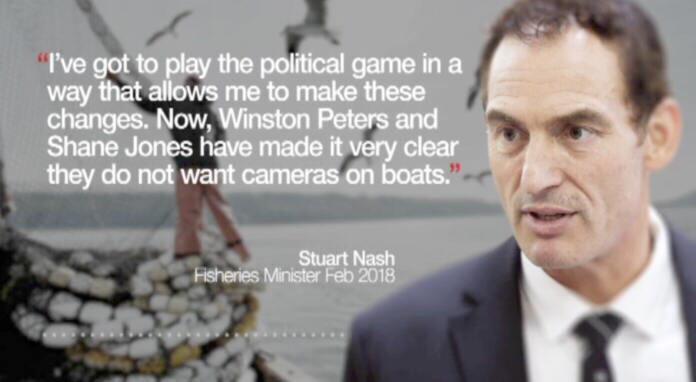Michael Morrah is one of NZs best environmental TV journalists, his focus on the obscene environmental corruption of private fishing companies alongside his work to uncover the political corruption that allows for that damage to occur marks him out as one of our best investigative reporters.
For years Morrah has been on the forefront of demanding cameras on fishing fleets so we can police over fishing and he has led the investigation into why those cameras haven’t been placed and the overwhelming body of evidence suggests the donations from the fishing industry into the pockets of NZ First has led NZ First to lobby on their behalf to stymie the cameras onto the boats.
His latest investigative piece asks more troubling questions of the collusion between lax regulations and the Fishing Industry…
Fishing industry tried to limit Government access to footage of undersized tarakihi – documents
New Zealand’s fishing industry initially attempted to try and limit what footage the Government could access in a crucial cameras on fishing boats project that is due to begin, documents show.
The cameras will be used to monitor undersized tarakihi caught by commercial trawlers.
The idea is that it wants to review the video to make sure the number of small ones caught by trawl vessels is being recorded accurately.
The fishing industry agreed, but in its original proposal obtained by Newshub under the Official Information Act, it said it would be an “industry-owned and managed project”, the footage would be “owned by the fishers”, and industry-funded auditors would review 30 percent of the footage. Fisheries NZ would then be provided with the same 30 percent of video, but only if various “scope, confidentiality, data access, intellectual property” documents are “agreed in writing” first.
“These confidentiality agreements are all about the industry trying to continue to draw its veil of secrecy across what’s going on at sea, and it’s not acceptable,” Forest and Bird’s chief executive Kevin Hague says.
…corrupt business interests are constantly trumping environmental concerns.
At some stage, the deeply corrupt NZ fishing industry must be forced to change, and it’s Morrah’s journalism that will lead that change.
Increasingly having independent opinion in a mainstream media environment which mostly echo one another has become more important than ever, so if you value having an independent voice – please donate here.
If you can’t contribute but want to help, please always feel free to share our blogs on social media.






Spot on, Martyn.
Totally right time to bring the corrupt fishing industry into account and nice to see one of the few environmental journalists making an effort to bring this corrupt industry into the public eye where fishing, exploitation of workers and ocean conservation is becoming a big mainstream issue .
NZ is the least corrupt country in the world !! Another 100% clean and green myth exposed.
Winston was always a contradictory bullshitter.
Let’s face it, National, Labour as well as NZ First have all taken fishing donations…. NZ First just got caught not declaring some of them. Greens have turned a blind eye on this issue as well and not got cameras on boats or enforcement under control while in parliament.
I’m voting for him to get NZ’er of the year – great journalism that serves NZ. Go Michael – hold those corrupt fishing fuckers feet to the flames!
Between the slave fishing and the failure to innovate you’d think the government would be dying to lift productivity and accountability in the sector. But they still suffer from Sealord guilt, having cobbled together a deal for Treaty fisheries rights that proved to be worth considerably less than its book value of $200 million (1990 dollars).
Japan employs over a hundred thousand people from a similar resource base, and it returns more than 100 times what NZ fisheries do – more than NZ’s whole dairy industry. If the NZ fishing sector were not substantially criminal, they’d die of shame at their incompetence.
Comments are closed.